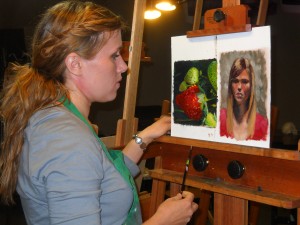Tips for Up and Coming Illustrators and those still in school, Part 1

I put together what I have for up and coming illustrators, and those that are still in school.
This is the advice I would want to hear if I were planning a long career in illustration. Now besides working here at Folio Academy, I also teach Illustration in Utah at UVU, and this is stuff I have been teaching to my students.
A few things every illustration student should know.
Now this is only part 1, so I plan on touching on a few things that hopefully I will be able to go over in more depth, while still being able to stay focused. What I want to touch on and go into later is
“Saying goodbye to the word Maybe.”
Getting started doing what you love.
The way things were and how they are now.
And is there enough room for all these different artists to make a living?
Getting started as an Artist, and doing what you love.
When getting started if you’re like me you wanted to make a living by doing something that you enjoy. What I wanted to do was to draw and paint. I wanted to paint for a living. Basically what I wanted was make money doing what I love to do.
The way things were
In the past you had to go through a middle man so you needed to find a person with money to get your illustrations out there to the market place. Either for products, or services, you needed executives, or publishers, you needed to get to the people in charge of hiring artists.
If you were an animator, illustrator, musician, filmmaker, an author, if you were an artist you needed someone to pick you, to choose you in order for your stuff to get published, for your voice to be heard.
This has been going on for a long time, from the days of Caravaggio all the way to Dr. Seuss. Caravaggio needed “the Church”, he needed rich people there to pay him. He needed to impress them enough so that they could say ‘Yes we will hire you to paint this or that painting’. All the way up to Dr Seuss, who had to impress a publisher, to be able to get his message, his stories told.
When it comes to traditional Publishing there have been two groups of artists, those who have been told Yes, and those told Maybe, (sometimes even a flat out No) and the group that has been told Yes is small group.
Is there enough room for all these different artists to make a living?
What about everybody else? Is there room for everyone else, or even just a lot of people? To be picked, to be chosen, to be hired, to be utilized as an illustrator? I will have to go into that more later, because I want to cover so much, such as a little more about publishers.
Publishers are limited to how many books they can publish every year. In fact most publishers have a list of a number of books they are willing to publish in a year.
I have even heard from Editors that there are times when they almost cry inside because they have to turn down a book they would like to publish but all the slots are filled on their list for that year. And some of those books do get chosen by another publisher, because they are so good, but sometimes that can take a year, or two and sometimes more, and quite frankly, many of them never get published.

Then we get to 2008 when the economy begins to go south, and the economy starts to really suffer. At the same time we’ve had Digital Media taking off. There are Story apps and digital eBooks. With that explosion the digital media started competing with printed books.
 Since the internet has exposed many more talented authors and illustrators with sites like Pinterest, Deviant Art, Illustration Friday, Blogs ect. artists are learning from each other and online. Online education has been getting better and cheaper. Sites like Lynda dot com, New-Masters academy, Folio Academy (that’s us) SVS, (school of visual storytellers) the Lamppost Guild, by Corey Godby and Justin Gerard. All kinds of online schools, easy access, online ways to learn and ways to improve your education, it’s getting cheaper and easier to obtain. And you can have inexpensive access to some of the best instructors in the world.
Since the internet has exposed many more talented authors and illustrators with sites like Pinterest, Deviant Art, Illustration Friday, Blogs ect. artists are learning from each other and online. Online education has been getting better and cheaper. Sites like Lynda dot com, New-Masters academy, Folio Academy (that’s us) SVS, (school of visual storytellers) the Lamppost Guild, by Corey Godby and Justin Gerard. All kinds of online schools, easy access, online ways to learn and ways to improve your education, it’s getting cheaper and easier to obtain. And you can have inexpensive access to some of the best instructors in the world.
Learning online vs at University
Now I do want to put a disclaimer here, I work for a University so I am definitely not saying that learning online is better than learning at a University. There are advantages to both, and here are some of the differences between learning online compared to a University: Financial aid, and long term exposure to your intended field can both be extremely beneficial. The opportunity to learn from other students, and networking. Responsibility from homework and other projects. A lot of the time online gives the information but no call to action, no accountability. There are many benefits to study at a university if you can.
The Amount of talent is skyrocketing, and the internet has made it possible to hire people all over the world. I used to think there was a lot of talent ten or twenty years ago. Back when everyone had a workbook that was a couple inches thick. Now you go on a site like Deviant Art, or Pinterest or Blogs, and it’s amazing how much talent is out there. If you can see it, and if I can see it then Art directors are seeing it. And now they have access to hire so many more people than they used to. This is giving people all over the world with different back grounds and educations the opportunity to illustrate for a living.
Say goodbye to Maybe
So I’ve been told yes, I was chosen and it has been very nice. I have enjoyed the benefits and the recognition, the speaking engagements, money, and of course the opportunity for more work. Because of that some people may ask why, if I’ve been picked, and accepted into the publishing world, why I would come back and talk about all this? The reason is because I feel like one of my callings is to be a teacher and I feel very strongly about truth in education. I don’t like it when a student is given half-truths or outdated information, especially at a university where students are paying top dollar for their education.
During your life you have been told ‘Maybe’, a lot of people have been told maybe. Maybe you can be published, maybe you can be hired, maybe you’ll be good enough someday, maybe you can do this. My kids say that maybe just means no. I don’t like to tell my kids no, I like to say YES. . . Yes if. . .
What I want to say is that in the past ten years you have been told yes, you just may not have heard it. You may be afraid of the word yes, you may be afraid of the opportunities available to you. You may not like the conditions that come with the word Yes.
My friend can colleague, Wayne Andreason says that yes is his favorite word.
I’ll talk more about that next time. For now just say goodbye to the word maybe.

